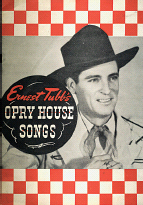The Grand Ole Opry (12 page)
Read The Grand Ole Opry Online
Authors: Colin Escott

Minnie Pearl became the small-town gossip and chatterbox that most of her listeners knew only too well. Her routine included
regular updates on her brother, her Uncle Nabob, and her boyfriend Hezzy. Minnie’s imagi- nary family became p1ended family
for many listeners
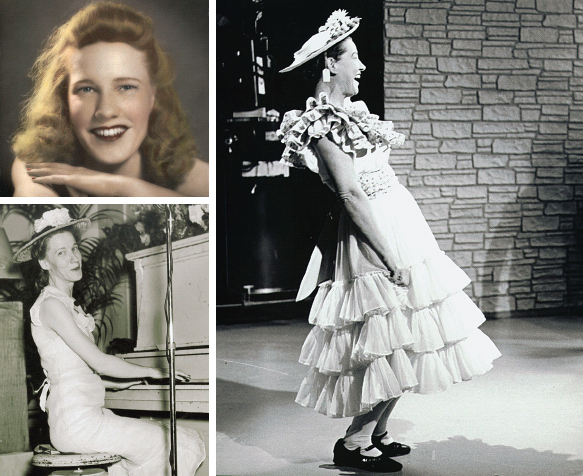
left: Sarah Ophelia Colley aspired to be Ophelia Colley on Broadway, not Minnie Pearl on the Grand Ole Opry.
right: “How-dee!”
MINNIE PEARL
Minnie started out as a gentle, very authentic girl from the mountains, but she’s more brassy than when she started. I created
the character in 1938. I had a job producing amateur plays around the Southeast, and I began to collect country stories and
I created this character. I thought “Minnie” and “Pearl” were the two nicest country names I could think of. I’m from Centerville,
Tennessee, and my father had a lumber business. There was a railroad that had a loading switch three miles from Centerville.
It was called Grinder’s Switch because the largest family that lived there were the Grinders. When WSM let me come on the
Opry, they said, “We think you ought to have a locale,” so I picked Grinder’s Switch because I didn’t think anybody would
be offended because so few people lived there. I’ve peopled it with my own people. I’m the only person who can see and hear
the sound of the people who live there whom I’ve created. Minnie’s a mountain girl and she has never worried about her education,
and she has never been intimidated by educated people. I just love to put on her white cotton stockings and one-strap Mary
Jane shoes.
When I first brought Minnie Pearl to the public on the radio, I used a very different type of salutation. It was “How-dee,
I’m just so proud to be here,” but the decibels were different.
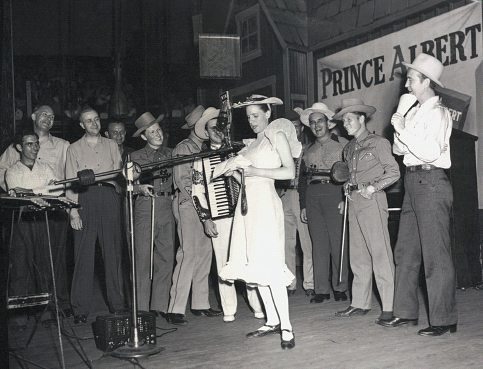
Minnie Pearl held her own with the predominantly male Opry cast.
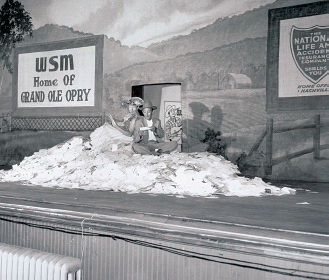
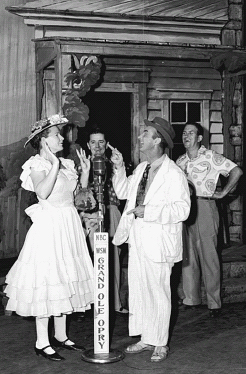
From 1948 until 1958, Minnie Pearl had a successful comedy partnership on the Opry with Rod Brasfield. They referred to their
style of comedy as “double comedy” because there was no straight man.
PEE WEE KING:
Early on, she was working for Roy Acuff [on the road], and she hadn’t perfected her introduction. She said, “How-dee. I’m
just so proud I could come.” And Acuff told her she’d have to change the last bit.
MINNIE PEARL:
Now I scream it out loud. When I went on the Prince Albert network portion of the Opry in 1942, the agency in New York suggested
that I scream it as a promotional stunt. The announcer said, “When Minnie Pearl says ‘How-dee,’ say ‘How-dee’ right back.”
Over the years, I got louder and louder, and the audience got louder and louder.
MINNIE PEARL
and
ROD BRASFIELD
routine:
MINNIE
: How-dee! I’m jes so proud t’be here!
Hezzy was over to see me on Wednesday and he brought a s’prize! (When Hezzy brings anything, it’s a s’prize!) He brought over
a box of candy and a box of nuts. He says to me, “I know you don’t care about sweets, so I brung the candy over to your mammy,
and nuts to you!”
Then me and Hezzy went in the front room and set down on the double settee. Oh, it was so romantic! He was a-settin’ there
and I looked into his eyes... and he looked into my eyes... and then he says...
ROD
: Hi-dy, Minnie!
MINNIE
: Well, Rod Brasfield! You come right in between me and Hezzy!
ROD
: I did, Minnie? You mean I was caught in the big squeeze?
MINNIE
: Yes, I was jes’ about to tell about Hezzy kissin’ me...The Star System
ROD
: Why, Minnie Pearl! You mean to say you’re one of them gals that kiss and tell? MINNIE: Why sure, Rod, what’s wrong with
that?
ROD
: I thought it was only the fellers that kiss and tell.
MINNIE
: Uh-uh, Rod... it’s the fellers that kiss and exaggerate! But ain’t it funny, Rod.... I’member the time when if my pappy
caught a feller kissin’ me he’d almost shake the feller’s teeth out. ROD: And what does he do now, Minnie?
MINNIE
: Almost shakes his hand off!
ROD
: I know just what you mean, Minnie. When I started to call on my gal, Suzie, Her poppy used to stand a shotgun in the corner
with a lily in both barrels. MINNIE: And he don’t do that no more, Rod?
ROD
: Nope... He puts a travelin’ bag in the corner with two tickets to Niagara Falls!
(From the Prince Albert Grand Ole Opry, February 13, 1954)
Ernest Tubb, like Bill Monroe and Roy Acuff, pioneered a new style of music. Tubb’s gritty honky-tonk music had its origins
in Texas and Okla-homa barrooms in the years after the repeal of Prohibition. He was the first to bring beer-joint music to
the Opry stage, and his addition to the cast proved that the show was looking beyond its traditional base in the Southeast.
Tubb had already recorded his signature tune, “Walkin’ the Floor Over You,” and was on the point of taking his career to the
np1 level when he appeared on a 1943 New Year’s Day show in Gadsden, Al-abama, with Pee Wee King. J. L. Frank proposed to
Ernest that he come to Nashville to join the Opry, and Tubb readily agreed.
ED LINN,
journalist, in Saga magazine:
Ernest Tubb began singing in the oil-field honky-tonks of Texas in the late 1930s. It was a poor Saturday night that didn’t
produce a couple of interesting brawls. Tubb had to meet the competition as best he could. “The harder they fought,” he says,
“the louder we played.” One night, a friend took a five-minute break and came back to find a bullet-ridden body sprawled across
the wreckage of his guitar. It was disconcerting. Good guitars were hard to come by in those days.
ERNEST TUBB:
I don’t read music and I’d fight the man who tried to teach me. I don’t care whether I hit the right note or not. I’m not
looking for perfection. Thousands of singers have tried that. I’m looking for individuality. I sing the way I feel like singing
at the moment. I never sang for the dollar. I sing because I want to sing.
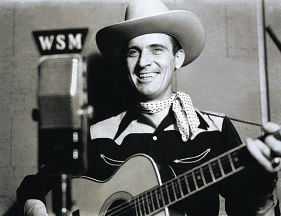
Ernest Tubb.
PEE WEE KING:
Ernest knew he was taking a big chance when he quit his job at the radio station in San Antonio and gave up the good-paying
gigs he played at the honky-tonks around there. But he hedged a bet. He left his wife and children behind and told them he
would try out Nashville first. It didn’t take long for Ernest to become popular. Within a few weeks he was getting bushels
of mail. He had a certain spark that set the Opry on fire every time he played.
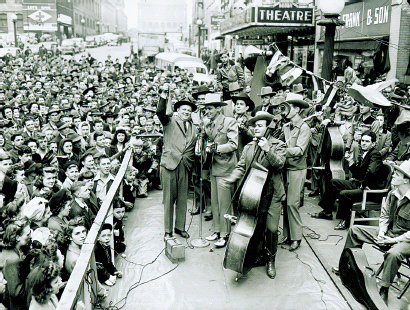
Wartime crowds gather on Nashville’s Broadway to hear Ernest Tubb and Whitey Ford—the “Duke of Paducah” (with his arm in the
air). Eddy Arnold awaits his turn, sitting to the right.
JUSTIN TUBB, Opry star and Ernest’s son:
To me, that’s when he became a star, to be that far away, and pick him up on the radio. Being made a member of the Grand Ole
Opry was the most important thing in my dad’s life. It was his badge of having made it. This was the tops in radio when people
would listen to radio like they watch TV now. It was very important to him to be back here every Saturday night for the Opry.
He traveled more than anyone on the show, except maybe Little Jimmy Dickens, but he bent over backwards to be in for the show.
WILLIE NELSON:
The first songs I ever learned were out of Ernest Tubb songbooks. I was as big an Ernest Tubb fan as people ever were Elvis
fans or Beatles fans. I grew up with him back in the 1940s.
